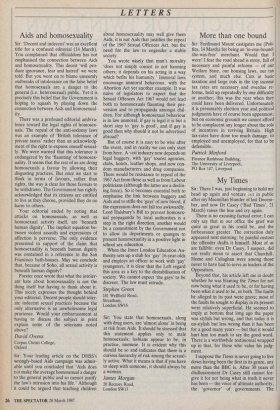Aids and homosexuality
Sir: 'Decent and indecent' was an excellent title for a confused editorial (14 March). You complained that officialdom has not emphasised the connection between Aids and homosexuality. This deceit 'will pro- duce ignorance, fear and hatred' we were told. But you went on to blame unseemly outbreaks of intolerance,on the false belief that homosexuals are a danger to the general (i.e. heterosexual) public. Yet it is precisely this belief that the Government is hoping to squash by playing down the connection between Aids and homosexual- ity.
There was a profound editorial ambiva- lence toward the legal rights of homosex- uals. The repeal of the anti-sodomy laws was an example of 'British tolerance of private tastes' rather than an acknowledg- ment of the right to express oneself sexual- ly. We were warned that this tolerance is endangered by the 'flaunting' of homosex- uality. It seems that the rest of us are doing homosexuals a favour by allowing their disgusting practices. But once we start to think in terms of favours, rather than rights, the way is clear for those favours to be withdrawn. The Government has rightly acknowledged that its citizens are entitled to live as they choose, provided they do no harm to others.
Your editorial ended by noting that attacks on homosexuals, as well as homosexual activity itself, are 'beneath human dignity'. The implicit equation be- tween violent assaults and expressions of affection is perverse. The only evidence presented in support of the claim that homosexuality is beneath human dignity was contained in a reference to the San Francisco bath-houses. May we conclude that, because of Soho, all sexual activity is beneath human dignity?
Forster once wrote that what the intoler- ant hate about homosexuality is not the thing itself but having to think about it. This nicely expresses the thought behind your editorial. Decent people should toler- ate indecent sexual practices because the only alternative is an unwholesome legal prurience. Would your embarrassment at having to discuss the subject in print explain some of the solecisms noted above?
David Owens
Corpus Christi College, Oxford


















































 Previous page
Previous page